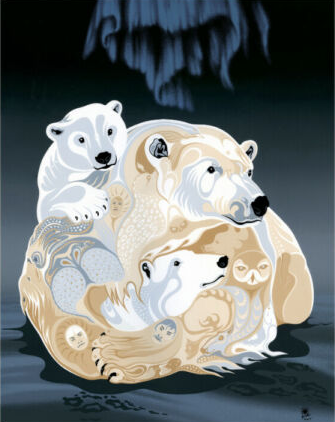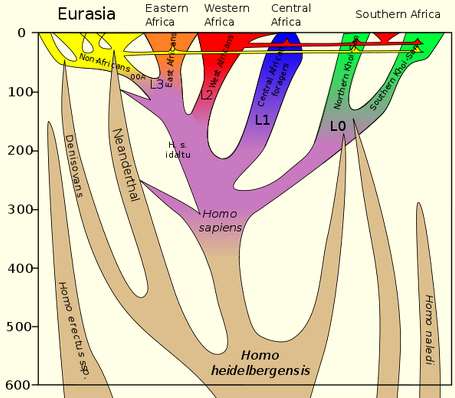
|
|
Differences beget differences 1
It seems convenient to perceive ourselves as made up of a body and a mind each even though these parts are not at all independent from one another. Nor are they independent from our environment. 3 Singling out homo sapiens, we readily perceive bodily and mental differences of such magnitude that this species is subdivided into races and we usually recognize the offspring of interbreeding among them quite readily. And further down the line, we still observe bodily differences among individuals such as facial features, hair, built, speech, mannerisms, and so forth, as well as mental differences, such as found in the gift of the gab. 4 Academic research has shown that people working in different fields (statistics, economics) react differently to everyday happenings. It has been shown also that brief training sessions can make people to think and react differently.* 5 Because of current notions of political correctness, I like it to be well understood that I am writing about differences, not about superiority or inferiority. With that in mind I like to turn to "The Geography of Thought" (2003) by Richard E. Nisbett.*. The word "Geography" strikes me as a careful verbal working around political incorrectness. 6 The book describes a theory about how and why Asians and Westerners think differently and why that is so. Furthermore, it shows confirmation by historical experience and by experimental observations. 7 Nisbett's reasearch has allowed him to, I'll quote: "answer many questions about social relations and thought that have long puzzled educators, historians, psychologists, and philosophers of science.... The puzzles and new observations range across many different domains, for example: 8 Science and Mathematics. Why would the ancient Chinese have excelled at algebra and arithmetic but not geometry, which was the forte of the Greeks? Why do modern Asians excel at math and science but produce less in the way of revolutionary science than Westerners?" Bear in mind that Nesbitt wrote his book 16 years ago, in 2003. In more recent times, Chinese scholars have been contributing greatly to the world's scientific literature. Nisbett's book approaches the subject by reaching back about 2500 years or so. Quoting: "The philosophies and achievements of the Greeks and Chinese of 2500 years ago were remarkably different, as were the social structures and conceptions of themselves.... The Greeks, more than any other ancient peoples, and in fact more than most people on the planet today, had a remarkable sense of agency—the sense that they were in charge of their own lives and free to act as they chose." 10 "The Chinese counterpart to Greek agency was harmony. Every Chinese was first and foremost a member of a collective, or rather of several collectives—the clan, the village, and especially the family." 11 Nisbett puts a spotlight on people's predominant way of living. Farming and irrigation call for far more co-operative effort than do hunting, herding, fishing, trade, and piracy. Co-operation requires people to get along with one another. Whereas Greeks were very much a sea-faring people, the Chinese were dependent on agriculture. And so, for example, whereas the more self-centered Greeks might carry on heated debates, Chinese would minimize friction by conceding points raised by others. "Chinese social harmony should not be confused with conformity. On the contrary, Confusius praised the desire of the gentleman to harmonize and distinguished it from the petty person's need for conformity." 12 The previous paragraph is, of course, only a rough sketch, a top-down view if you wish. When it comes to details, variations come into focus. Think, for example, the difference between Athenean society and that of the land-locked Spartans in ancient Greece. Or, moving on to the present, the difference found between the under-educated masses and those better schooled. Think also of the social mixing of Westerners with Asians, and social mixing with other peoples as well. 13 Moreover, "every individual within a given society moves quite a bit between the independent and interdependent poles over the course of a lifetime—over the course of a day, in fact. But the variations between and within societies, as well as within individuals, should not blind us to the fact that there are very real differences, substantial over the average, between East Asians and people of European culture." 14 Retracing how thinking appears to have developed differently in different contexts—very condensed: "This economic-social account happens to fit with some important changes in the West. As the West became primarily agricultural in the Middle Ages, it became less individualistic. The European peasant was probably not much different from the Chinese peasant in terms of interdependence of freedom in daily life or in rationalist approach to reasoning. And in terms of intellectual and cultural achievement, Europe had become a backwater. While Arab emirs discussed Plato and Aristotle and Chinese magistrates displayed their proficiency in all the arts, European nobles sat gnawing joints of beef in damp castles." 16 Then Western Europe within a few centuries went by way of trade and trades to learning and building universities—endeavors in which Roman Catholic scriptoria and schools as well as a "universal" language, Latin, have played key roles—banking, exploring the world for profit, and so on. Currently, East Asia is, for one and all to see, going through a similar process at an accelerating pace, yet, apparently, mellowed by the "Middle Way." There is little doubt in my mind that East Asians are also learning from the faults of Western society. Still questionable is whether Western movers and shakers will recognize what is wrong with our own institutions. 17  For an embedded-figure test of my own devising I chose for complex background an image by Dene artist Archie Beaulieu. How many animals will you see within, say, a minute? How are others doing? 18 Nisbett's theory of why Greek and Chinese societies developed in such different ways can be tested in the laboratory and allows predictions. One of a variety of tests is an "embedded figure test," i.e. one's ability to locate simple figures within a complex background. People accustomed to attending to objects, things as well as personal goals, find that easier than those who are more concerned with relationships. You might like to try it here, preferably along with others and comparing the results with, say, how outgoing the participants are. Not exactly well-controlled science, but it might be fun. 19 Besides cultural differences between the West and the East, it has been shown by researchers from Royal Holloway, University of London that concrete differences exist in how, back in 2011, Britains and Chinese recognize people and the world around them differently. Quoting from my source*: "it helps us understand much better some of the cultural differences between East and West which people can sometimes find disconcerting." 20 "For example, while most British people look at a person's eyes when they are talking to them, Chinese people are much less likely to make eye contact. 'This can leave the British person feeling uncomfortable and distrustful .... On the other hand, the Chinese person would consider eye contact to be potentially disrespectful and impolite'." 21 "While adults from Western cultures process information analytically by focusing on key features, adults from the East process information in a more holistic style, which also takes context and situation into account. 22 "In terms of eye contact for example, this means that when a Westerner processes a person's face they will typically fixate on the key feature of the face, usually the eyes. An Easterner, in contrast, will largely avoid the eyes (hence the lack of eye contact) and take in information from a wider area below the eyes and around the nose. Interestingly, the studies also show that when asked to recognise other unfamiliar stimuli, such as sheep faces, Westerners and Easterners continue to employ their different face processing strategies in animals." 23 I am inclined to believe that, aside from the evidence for a concrete difference in vision, interbreeding between homo sapiens and other human species may well have resulted in varieties of cognitive processes among peoples—as well as of physical appearances. 24 * * *
The focus Nisbett's work is on contexts of sensoral input (starting out with how best to make a living given a particular ecology) and comparisons of output of habitul ways of thinking. As for the biological processing of thought., understanding this still has a long way to go. "But," independent researcher Roger Ellman wrote in 2015, "it is the 'software', how the neural components logically interact, that produces the higher level results that we experience in our minds," Ref. "Thoughts and Thinking – the Mechanism of Intelligence". Five years later, Ellman published "How the Brain Produces Mind and Consciousness." Its abstract reads, "Can the Brain comprehend itself? Is it possible for the Brain to figure itself out? Is it possible for the Brain to understand itself, to explain consciousness? Yes." 26 All fine and dandy, but as for myself, I like to turn especially to how thoughts are expressed by words. If only I were clear in my head how to go about that. 27
References Nisbett, R.E., "The Geography of Thought" (2003). * fn1 About Richard E. Nisbett. * fn2 East views the world differently to West The study referred to in this article may be found here. Furthermore see. * fn3 |
--
| top of page |
|
